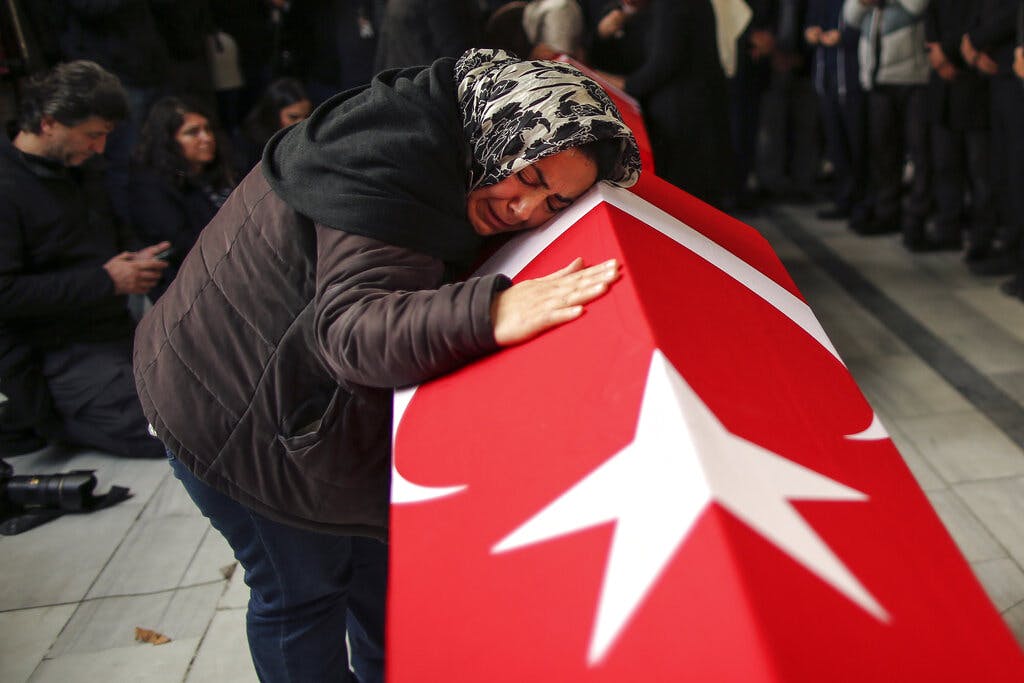Turkey Tries To Finger Yanks, Kurds for Terror Bombing at Istanbul
America and the Kurds deny responsibility amid whispers about other possible causes, including ISIS responsibility or a false flag operation.

The government of President Erdogan, in the face of Sunday’s apparent terrorist bombing that killed six people at Istanbul, is exploiting the event to stoke national anger against Turkey’s perennial political boogiemen — America and the Kurds.
Shortly after the bomb was detonated at a busy Istanbul shopping area, government accusations about Kurdish and American responsibility were met by whispers about other possible causes, including ISIS responsibility or a false flag operation. In a country where the government controls the press, conspiracy theories spread fast.
Turkish security forces arrested a woman, Ahlam Albashir, claiming grainy surveillance video footage identified the Syrian national as the person who hid a bomb in a raised flower bed shortly before the attack. They also said Ms. Albashir then admitted she had been trained in Syria by forces affiliated with Turkey’s Kurdish Workers Party, or PKK.
A picture of Ms. Albashir in custody, wearing a sweatshirt with the words “New York,” was apparently meant to convey guilt by association. The Kurdish fighters in Syria, known as YPG, serve as America’s main ally in the war against the Islamic State. The Turkish army often attacks the Syrian Kurds, whom America has long financed and trained.
On Sunday Ankara’s interior minister, Suleyman Soylu, accused the PKK of committing the Istanbul attack. Without providing much evidence, he said that “the order came from Kobani,” the regional capital of the Syrian Kurds. While Washington denounced the attack, he also blamed America for an alleged role in it.
America “condemns the act of violence that took place today in Istanbul,” the White House press secretary, Karine Jean-Pierre, tweeted yesterday, adding that America stands “shoulder to shoulder” with Turkey in the war against terrorism. The American embassy at Ankara sent “condolences” to the victims.
We “reject the condolences of the U.S. Embassy,” Mr. Soylu said during a press conference today, adding that America is complicit in the Istanbul attack due to its support of the Syrian Kurds. Washington’s solidarity statements are “like the murderer being the first to arrive at the scene of the crime,” he said.
Kurdish organizations denied responsibility. “Our people and the democratic public know closely that we are not related to this incident, that we will not directly target civilians,” the PKK announced in a statement issued by its Firat news agency. The Syrian Kurds also denied responsibility.
At the height of its war against the Turkish government, the PKK typically claimed responsibility for attacks. Yet, for several years the group, which the Department of State has listed as a terrorist organization since 1997, has tried to shed its past militancy in favor of political activity. Turkey, nevertheless, often bombs PKK bases in Iraq, as well as the American-backed Syrian Kurds.
After nearly six years in which there were no serious attacks against civilians in Turkey, the Sunday terror bombing could mark the return of harsh security measures in the country. Some fear that such measures would even become tougher with the approach of next June’s presidential and parliamentary elections.
There are “hints at a premeditated campaign of terror orchestrated by Ankara, with the US and Kurds pre-designated as the perpetrators,” a Foundation for the Defense of Democracies Turkey watcher, Sinan Ciddi, tweeted. He later told the Sun that while “there is no hard evidence that the Turkish government is behind the bombing, they’re certainly trying to capitalize on it.”
Mr. Soylu, who is seen by some as a possible future successor to Mr. Erdogan, is one of Ankara’s most anti-American politicians. He has long accused the Obama administration of being behind the failed 2016 coup against Mr. Erdogan, and the Trump administration has sanctioned him.
Sanctions were imposed for the interior minister’s role in the arrest and imprisonment of an American pastor, Andrew Brunson, and then for his responsibility for attacks against bases in Syria. In both cases the sanctions were removed quickly.
In the last few months Mr. Erdogan has tried to repair long-fraught relations with another close American ally in the region, Israel, in the hope that Turkey could host a pipeline that would transfer Mediterranean Sea-derived natural gas to Europe from Israel.
The two countries have returned ambassadors to Ankara and Tel Aviv, respectively, and Mr. Erdogan was one of the first heads of state to congratulate the prime minister-elect, Benjamin Netanyahu, on his recent election victory.
Last week, however, the foreign minister, Mevlut Cavusoglu, announced that Ankara has rejected an Israeli request to expel Hamas leaders who have made Turkey their home. “We do not see Hamas as a terrorist organization,” he said.
In the spring, Turkey reportedly foiled a terrorist attack against Israeli tourists in the country. Several days ago, Turkish Jews marked the anniversary of a 2003 Istanbul synagogue terror attack that killed 20 people. Today the Israeli ambassador at Ankara, Irit Lilian, told Kan radio that currently all of Turkey is on edge, fearing a new state-wide terrorist wave.

